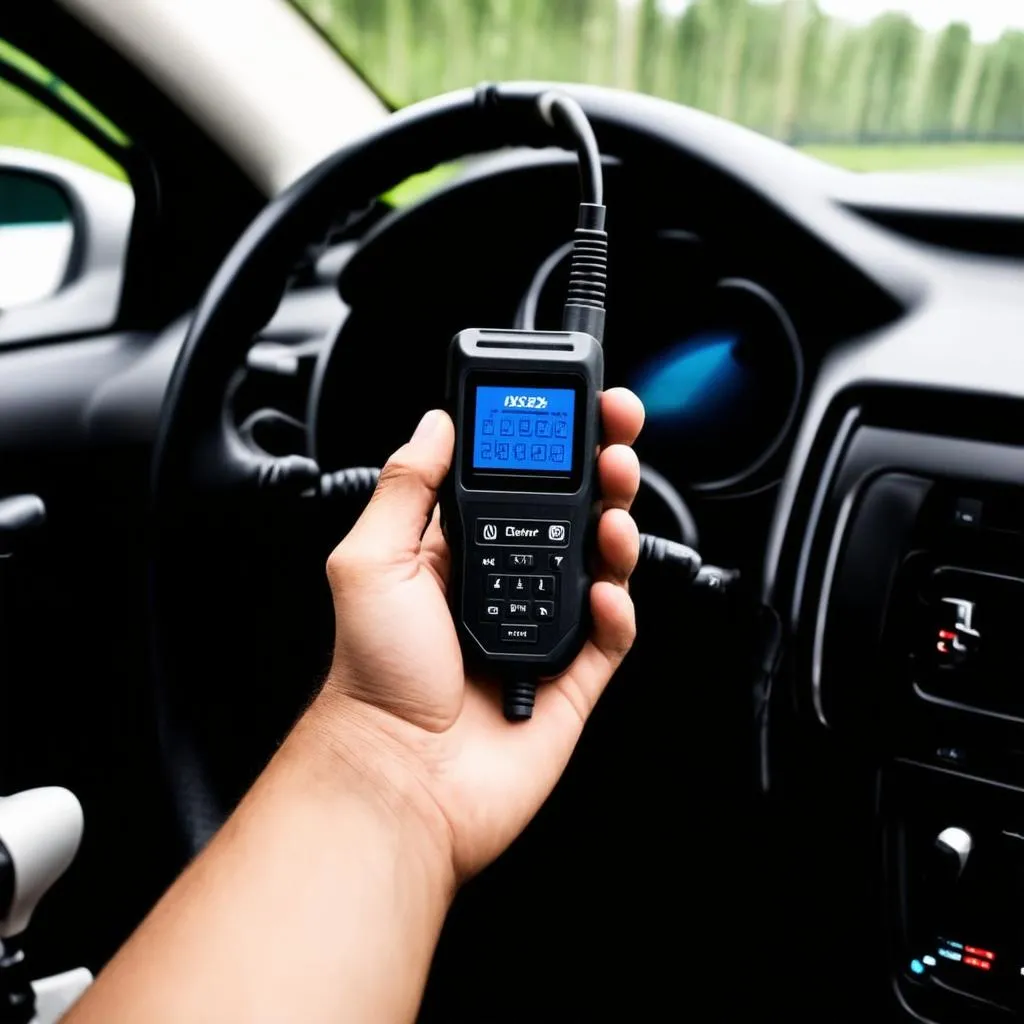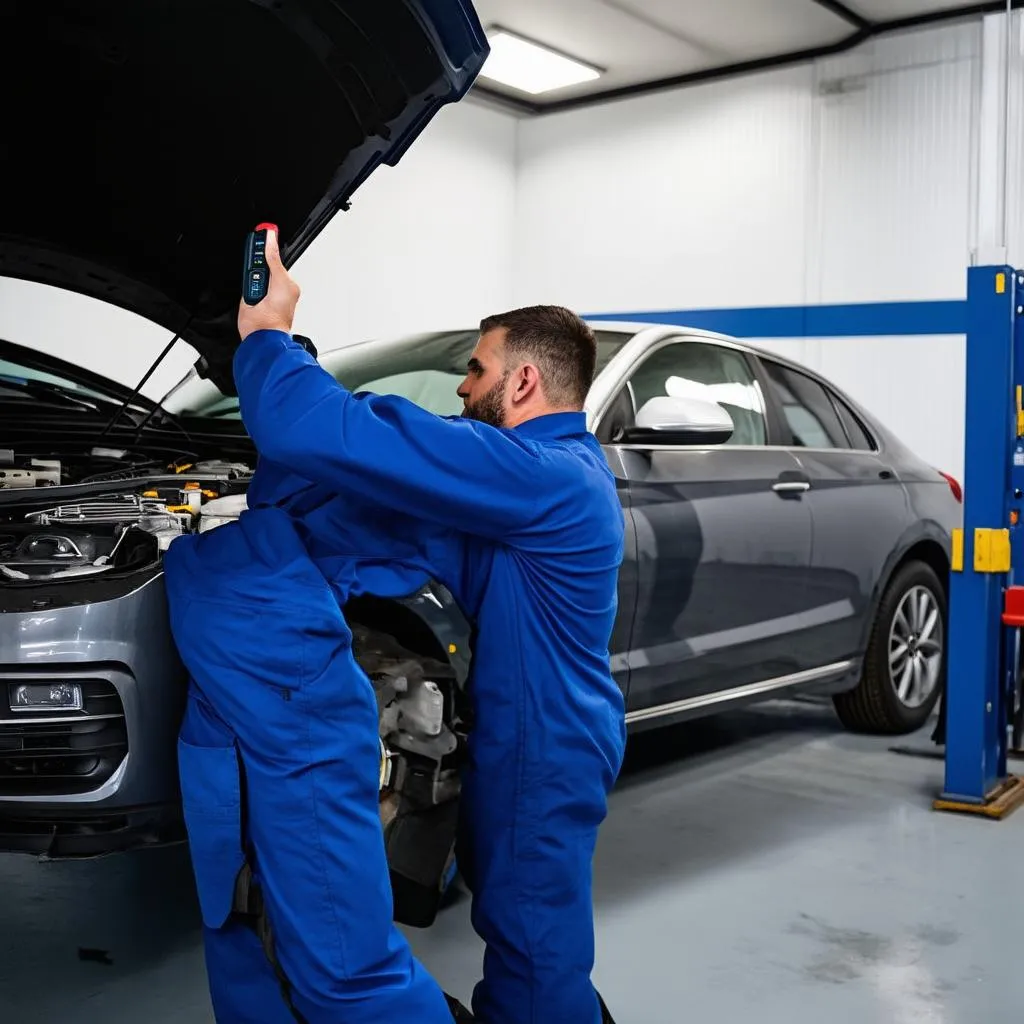“Can I really check OBD codes without a scanner?” John, a friend of mine, asked me this the other day, his voice laced with a mix of hope and skepticism. His beloved ’98 Honda Civic was acting up, and the dreaded “Check Engine” light was staring him down like a disapproving teacher. We’ve all been there, right? That yellow light, a constant reminder that something is amiss, leaving us feeling like we’re driving around with a ticking time bomb.
John, like many car owners, was hoping for a quick and free way to decipher the code before resorting to a mechanic or buying a scanner. This got me thinking: how many others are searching for the same solution? Let’s dive into the world of OBD codes and explore whether a scanner-free diagnosis is truly possible.
Decoding the Mystery of OBD Codes
Before we unravel the “without a scanner” mystery, let’s understand what we’re dealing with. OBD stands for On-Board Diagnostics, a system that acts like your car’s internal doctor.
What Does the OBD System Do?
Think of it this way: Your car’s engine is a complex network of sensors, actuators, and systems, all working in harmony (ideally). The OBD system continuously monitors these components. When something goes awry, exceeding pre-set parameters, the system generates a specific code, storing it in the car’s computer. This is your cue—the “Check Engine” light—telling you to investigate.
Why Do People Want to Check OBD Codes Without a Scanner?
The answer often boils down to cost and convenience. OBD scanners, while incredibly useful, can range from affordable to quite pricey. Some folks might be hesitant to invest in a tool they may only use a handful of times. Others might be looking for a quick diagnosis before deciding on their next steps.
Can You Truly Check OBD Codes Without a Scanner?
Here’s the honest truth— while there are workarounds, they aren’t as straightforward or reliable as using an OBD scanner. Let’s look at some common methods people try:
1. The Paperclip Trick
This method involves jumping specific pins on your car’s OBD-II port (usually located under the dashboard) with a paperclip or wire. This can sometimes trigger a flashing sequence of lights on your dashboard, which can theoretically be deciphered into codes.
The Catch: This method is primarily effective on older vehicles (pre-1996). Modern cars with more complex computer systems likely won’t respond to this trick. Furthermore, deciphering the flashing lights can be confusing and inaccurate.
2. Using a Gas Pedal Combination
This method involves turning the ignition on and off in a specific sequence while pressing the gas pedal a certain number of times. While this sounds like an urban legend, it has worked on some older car models.
The Catch: Like the paperclip trick, this method is highly unreliable, especially with newer cars. You might end up resetting your car’s computer instead of retrieving codes.
Why an OBD Scanner is Still Your Best Bet
While the “scanner-free” methods might sound tempting, they are often more trouble than they’re worth. Here’s why an OBD scanner remains the gold standard:
- Accuracy: OBD scanners communicate directly with your car’s computer, providing accurate and detailed code readings. No more guessing games with flashing lights!
- Ease of Use: Modern OBD scanners are user-friendly, often with plug-and-play functionality. They often come with clear instructions and might even offer code interpretations.
- Additional Features: Many scanners offer advanced features beyond just reading codes, such as:
- Live data streaming: Monitor engine parameters in real-time.
- Resetting the check engine light: After addressing the issue, you can easily turn off the light.
- Freeze frame data: Get a snapshot of engine conditions when a code was triggered.
Finding Your Zen With Car Troubles
Facing car issues can be stressful. Just as a cluttered space can disrupt our mental peace, a malfunctioning car can throw off our equilibrium. In many spiritual traditions, cars are seen as extensions of ourselves, reflecting our journeys and aspirations.
While I don’t recommend relying solely on intuition or “car whispering” to diagnose a “Check Engine” light, I do believe in approaching car maintenance with a calm and mindful attitude. Understanding the problem, even if it means investing in a reliable diagnostic tool like an OBD scanner, empowers us to take control and restore harmony to our vehicles and our lives.
 OBD scanner plugged into a car's OBD-II port
OBD scanner plugged into a car's OBD-II port
FAQs About Checking OBD Codes
Q: Can I use any OBD scanner on my car?
A: Not necessarily. While most modern cars use the OBD-II standard (since 1996 in the US), older vehicles might require specific scanners. Check your car’s manual or research online to confirm compatibility.
Q: What if I clear the codes, and the light comes back on?
A: This usually indicates a persistent issue that hasn’t been addressed. Simply clearing codes is like silencing an alarm clock without actually waking up to address the day ahead. It’s crucial to diagnose and fix the underlying problem.
 Mechanic using an OBD scanner to diagnose a car problem
Mechanic using an OBD scanner to diagnose a car problem
Q: Is it safe to drive my car with the “Check Engine” light on?
A: It depends on the severity of the issue. A flashing “Check Engine” light often indicates a serious problem that needs immediate attention. In some cases, driving with a flashing light can cause further damage. It’s always best to err on the side of caution and get your car checked as soon as possible.
Take Control of Your Car’s Health
Remember, your car is trying to communicate with you. While deciphering its language might seem daunting, the right tools and information can empower you to become a more informed and confident car owner.
If you’re ready to explore the world of OBD scanners, we’ve got you covered! Check out our in-depth reviews and comparisons of the best OBD scanners for European cars, top-rated OBD apps for iPhone, and even insights into finding the elusive OBD port location on your 95 Jeep Grand Cherokee.
Still feeling lost in the labyrinth of car diagnostics? Don’t worry, we’re here to help! Contact us on Whatsapp at +84767531508 for expert guidance on all things OBD, from choosing the right scanner to understanding those cryptic codes. Our team of automotive gurus is available 24/7 to answer your questions and help you get back on the road with confidence.
Happy driving, and may your journeys be filled with smooth roads and even smoother engine performance!
